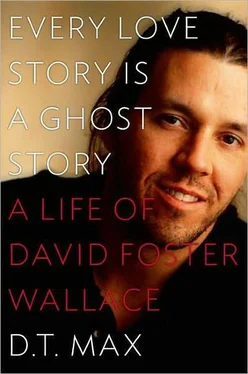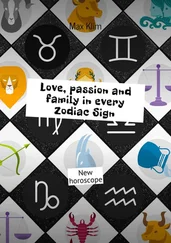Yaddo turned Wallace’s head. In Arizona he had been the top student, his success the object of envy, even among some of the teachers. Now he would go by the mail table in the main hall and see messages from famous agents urging their writers to call them back about movie deals and foreign rights. McInerney had a Porsche and a girlfriend who was a model. While Wallace was at Yaddo, a feature from Esquire came out, “Who’s Who in the Cosmos,” an update of a graphic the magazine had first published in the mid-1970s, a map of the literary universe. Wallace was both pleased and disappointed to find he was among the writers “on the horizon”; better than being left out entirely, but not in the “media showers” section with McInerney, let alone in the “Red-Hot Center” with John Updike, Norman Mailer, and Saul Bellow. At the same time, he was mad at himself for caring about such trivialities — indeed caring about them obsessively, as he was discovering.
This seductive overload came at a delicate time for Wallace. He was still trying to come to terms with the fact that writers of interesting and challenging fiction had to teach. He had never met one who could make a living just on his or her writing until now. Writers like McInerney and Mona Simpson, who was also at the retreat, seemed to him to have found a solution, and their success suggested to him that he was maybe on his way to being famous enough that he might be able to avoid his fate. But what did you have to do to be a famous, rich writer? Wallace wanted to know. Could you still be serious ? Or did success inevitably corrupt the artist? By concidence, he was about to answer that question for himself. Us magazine had approached Wallace to take part in a fashion spread at El Morocco, the reborn New York supper club. The shoot was to center around Tama Janowitz, whose story collection Slaves of New York had followed McInerney’s and Ellis’s books onto the bestseller lists. Us ’s article was meant to convey — or if necessary invent — the excitement of New York literary life and put forward a cohort of hot young writers. In the middle of his stay at Yaddo, Wallace drove down to New York. The four authors other than Janowitz met in a trailer outside the club to choose their clothes. The others reached for loud checks and glistening sequins. Wallace somehow found an old T-shirt and ripped jeans, emerging even more himself than he had gone in. Exchanging pleasantries with the others, he bragged that he had just been at Yaddo, shooting pool with Jay McInerney.
The group gathered in the salon of the nightclub. Janowitz entered, her hair teased out into a mountainous coif, wearing a leopardprint dress. “You look beautiful,” Wallace told her quietly. The photographer began barking directions. He choreographed the other writers in attitudes of adulation toward Janowitz. “Look like you’re having fun!” he ordered. Wallace quickly walked out. He told Walden later it was the look of his fellow writers, their eyes as they stared at the camera, that made him flee.
He went to see his editor, Howard, who took him to lunch. Wallace was very shaken. He was confused by what he had seen; yes, this lust for fame, for recognition, he certainly had it too, especially if it could get him out of teaching. But where did it lead? To what he had just witnessed? What if he fired Nadell and hired a powerful New York agent? Might he then have the life he wanted? Of course he wanted bigger advances, more fame, a more powerful agent, but to have these things one had to write to please and was he really willing to do that? He did not even know how to do that — or maybe he knew it too well. If he was going to fight the devil would he have to spend his life teaching? His mind was stuck in a loop and he cried in anguish. He talked on and on. Howard was now getting a first glimpse of the “obscurely defective” Wallace, the one having so much trouble being “human in a human community.” He talked the twenty-five-year-old Wallace down, he remembers, as if he were on “a bad acid trip.” Finally Wallace calmed down and went off to Alice Turner’s house near Washington Square to spend the night.
An already hard visit to New York became harder. That night a bag with the manuscript of “Westward” was stolen from the trunk of Wallace’s beat-up Nissan. He found the bag in a nearby Dumpster but not the manuscript. He was devastated, but this turned out to be a break in a way, because he then had reason to race back to Yaddo, where he wrote a draft of the entire story from scratch in, he would claim, “like, a week.” He took cold baths every evening to stop his brain from whirring. He finished it just in time for the short-story manuscript Viking Penguin was planning to publish in 1988.
Wallace was proud of what he had achieved at Yaddo. He left with a feeling he had never had before of having done what he set out to do. “I’m sure page for page, it’s a better book than TBOTS,” he wrote Nadell of the collection, “maybe not as fun to read, but it’s smarter, and there’s a lot less deadwood.” He added that he hoped Viking Penguin wouldn’t see it as some sort of detour until “the kid can get back on track writing gags.” His unsual enthusiasm may have been more of a response to the stress he was under — withdrawal from pot made him highly agitated — than from what he had achieved on the page, but he was certain he had done remarkable work. He told Howard that with the story “Westward” he had “broken through.” Even two years after, he would write, in a letter to Jonathan Franzen, who had become a friend and, like nearly all Wallace’s friends, wondered why Wallace held “Westward” in such special regard, that the novella was
in my view far and away the best piece of sustained fiction I’ve ever written. It is exactly what I wanted it to be [and is] also truly about everything I either had to write about or die in ’87…. My hope is that it succeeds on about 12 different levels, depending on whether you’re more interested in advertising or 80’s fiction or 60’s metafiction or the revelations of John — disciple not Barth or etc.
The story served such a personal need that he did not care what anyone thought about it — or him. When Franzen told him that the effect of the story was as if the reader had walked into a party full of “asshole[s],” Wallace responded, “If the story seems pretentious maybe it is,” and went on:
I have met assholes, and if “Westward” strikes you as the work of an asshole I’ll smile and apologize and say I appreciate your letter.
If proud of his fiction, though, Wallace was ashamed of his behavior. He did not like to expose his fragility. “I actually cried in front of [Howard] at lunch in some 23rd St. Bistro— gak, ” he wrote Nadell in September, still worried a month later. But she, he felt, deserved an even bigger apology: if he had offended her, it would give him “the howling fantods.” For the “dark time” in New York, he blamed the stress induced by writing “Westward” (“I sort of had to get myself in a State to finish that thing,” he explained), as well as
a very strange social, hierarchical Yaddo atmosphere, affecting the above Dark Time most directly as a bunch of advice from Older Writers that was, I’m sure, meant as helpful but turned out to be sort of misguided. Many of these Older Writers seem to have the equipment both to try to write OK fiction and to concern themselves aggressively with issues like money, representation, etc. I simply cannot.
He added, hopefully, “You and I have good enough communication lines that I don’t worry about irreparable offense to you.” He was right: Nadell knew Wallace better than he knew himself, and she knew he now knew how much he needed her. 5
Читать дальше












